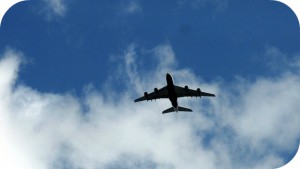 For the airline industry, the last few decades have been more like a rollercoaster ride than a smooth flight through calm skies. Enduring consistent losses as well as the occasional bankruptcy, companies began making deep cuts to basic services in order to keep costs down. Meanwhile, airfares continued to skyrocket even as in-air amenities started disappearing. Now it finally seems like all that belt-tightening is paying off: last year the four biggest domestic carriers together earned about $22 billion in profits.
For the airline industry, the last few decades have been more like a rollercoaster ride than a smooth flight through calm skies. Enduring consistent losses as well as the occasional bankruptcy, companies began making deep cuts to basic services in order to keep costs down. Meanwhile, airfares continued to skyrocket even as in-air amenities started disappearing. Now it finally seems like all that belt-tightening is paying off: last year the four biggest domestic carriers together earned about $22 billion in profits.
While the airlines’ spendthrift ways certainly helped put them back in the black, their biggest boost came from the global drop in petroleum prices. Jet fuel currently costs a third of what it did three years ago, thereby removing a major obstacle along the path to profitability. Still, don’t expect airlines to pass too much of the savings onto passengers. Despite carriers’ increased profit margins, airfares have remained high over the last two years and they’re likely to stay that way. However, a few airlines are making minor concessions to their customers. United and American, for instance, have reinstated free snacks on all domestic flights.
Part of the reason why airlines can do business this way is because demand for air travel rarely drops. After all, flying is about the only option available for people looking to cross a country or an ocean quickly. Along with steady and heavy demand, market consolidation has also played a big part in keep flight prices high. Over the past decade United, Southwest, Delta and American Airlines have been gobbling up smaller carriers, thus making it easier for them to charge higher prices. For example, United’s 2010 purchase of Continental Airways gave the company control of 70 percent of the flights going in and out of Newark Airport. As a result, airfares at the New Jersey hub are the highest among the nation’s top airports. So while airliners will likely enjoy sky-high profits as long as oil prices stay down, passengers can expect to receive little more than peanuts.
Questions:
- Many countries in Europe are linked by high-speed railways that create an alternative to air travel. Would something like this work in the U.S.?
- Is it ethical for airlines to charge such high fares while their operating costs are dropping?
Source: Jad Mouawad, “Airlines Reap Records Profits, and Passengers Get Peanuts,” The New York Times, February 6, 2016. Photo by Sean MacEntee.
